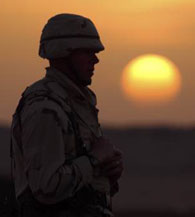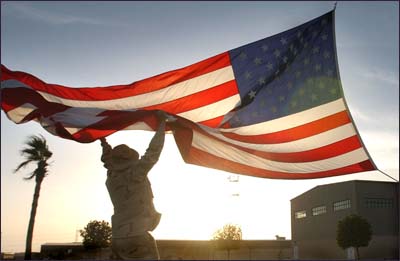Reprinted from NavySEALs.com
Beyond the DropZone
W. Thomas Smith Jr. Executive Editor
HERE ARE THE FACTS: There were indeed weapons of mass destruction (WMDs) in Iraq (Saddam used them on his own people). There were terrorists moving freely within the borders of Iraq prior to the U.S. invasion. There were conversations taking place between international terrorists and Iraqi officials before 2003. President Bush did not instigate the bombing of the Golden Dome mosque in Samarra last year (thus triggering the new, increasingly sectarian-fighting phase of the war). Iraq is not a lost cause (unless the anti-Iraq War crowd is allowed to have a free hand in war policy). Iraq is not a meatgrinder (I'll get to what is in a moment). What happened at Abu Ghraib and, allegedly, Haditha are not the results of some dark policy initiated by some secret White House inner circle. Unlike the terrorists and guerrillas, targeting non-combatants is not the modus operandi of our soldiers. And anyone who says otherwise is simply fomenting propaganda for political purposes or repeat-mouthing misinterpretations of realities they basically know nothing about.
But they’re doing it, and they’re getting away with it.
Worse, if you disagree with them, you’re considered a crackpot who loves war, “hates all living things,” and has bought into some grand conspiratorial lie.
Recently, I had a conversation with one such person – a friend in fact – and tried to explain to her that I believed the war in Iraq is far more complex than her black-white, right-wrong perception of it.
I was trying to be diplomatic by explaining, without condemning her own opinions, that the war in Iraq – including the counterterrorism and insurgency components; geostrategic issues and regional balances of power; divided political ideologies (there in Iraq and here at home); evolving mission plans; policies; manipulative, self-serving U.S. politicians both Democrat and Republican; historic hatreds in Iraq; twisted interpretations of religious faith; lack of trust; fear; money; oil; alliances; and lives (soldiers and civilians) – is a difficult conflict with multiple shades of gray: Thus, extremely difficult to prosecute, but vital that we do so successfully.
“No,” she snapped back. “It’s about right and wrong.” Period.
Of course, her side is right, and mine is wrong. According to Dinesh D’Souza (The lie that Bush lied, March 12, 2007), the reason the Iraq debate became so “acrimonious,” was because “mainstream Democrats went from accusing Bush of bungling the Iraq war to accusing him of lying to get America into that war. His crime, at this point, became not merely one of error but one of deliberate deception. The basic liberal reasoning is that no weapons of mass destruction were found in Iraq, therefore Bush has been misleading the American people all along.”
D’Souza’s assertion is correct. And if anyone were to even hint in 2007 that the reason no WMDs were found was because Saddam had moved them out of the country – perhaps across the border into Syria or even Iran, where he moved the bulk of his air force in 1991 – they would be considered by the Left to be completely misguided or worse.
Yet Middle Eastern terrorism expert Dr. Walid Phares, author of Future Jihad, contends that obvious factors should be our lead.“First, the evidence regarding past possession and use is abundant,” Phares, told me earlier this week. “Second, we have no information as to what happened to these weapons.”
Phares, whose grasp of the dynamics of global terrorism has earned him the respect and audiences of everyone from the U.S. Congress and State Department to CNN, MSNBC, and the FOX News Channel, even the Oprah Winfrey Show, argues that Syria would have been an easy sanctuary.
“Syria’s regime – which opposed the invasion – opened its borders to Jihadists who crossed into Iraq after the fall of Baghdad,” he says. “A large number of Baathists took refuge in Syria; and there are various reports from the Syrian opposition that many trucks crossed the border between the two countries weeks before the invasion began, and days before Baghdad fell. So, are Iraq’s WMDs – or some of them – in Syria? That is a very real possibility.”
Unfortunately, that very real possibility is almost never discussed by anyone – on either side – anymore. It’s so much easier and politically expedient for those on Capitol Hill to give more credence to people who paint their faces and march down streets holding signs proclaiming, “Bush lied. People died.”
Then there are the additional elements of propaganda, like downplaying Iraqi elections (damning the elections with faint praise and practically ignoring the enormous percentage of Iraqis who risked their very lives to vote) and playing up the U.S. casualty figures (without lending any perspective to those figures by looking at the astronomical losses suffered by the U.S. in previous wars) – all for the sake of political hay.
Regarding the latter, so many on the Left without any fair measure of military history, loosely refer to Iraq as a “meatgrinder,” claiming that the losses are numerically enormous and proof of “Bush’s failure.” This is wrongful manipulation.
First of all, every loss is grievous to the nation, particularly to the families of those killed and seriously wounded. But let’s look at the actual numbers for perspective: Nearly 3,200 American servicemen and women have been killed (and more than 23,400 wounded) in Iraq since the invasion, four years ago.
Compare that with 19,000 U.S. soldiers killed and nearly 62,000 wounded in just six weeks of fighting in the Battle of the Bulge (late-1944, early 1945). Some 500,000 American G.I.s were involved in that battle. And though the U.S. Defense Department does not break down the actual number of Iraq veterans from Afghanistan veterans, the number is nearly 1.5 million with the majority having served in Iraq.
Hardly numbers representing a failure or a meatgrinder. But those who hate the current administration, for whatever reason, seem to repeat-mouth what they hear.
Then there is the trend toward blaming the previous year’s surge in sectarian violence on the Bush administration, as if the president had anything to do with the blowing up of the Al-Askari (Golden Dome) Mosque in Samarra (February 22, 2006).
The bombing, which served as a catalyst for the new sectarian fighting, was an al Qaeda operation aimed at destabilizing a tenuous union between Iraqi factions in hopes of bringing down the new Iraqi government. It was a major setback for our efforts in Iraq, though all wars have setbacks. It temporarily strengthened the position of al Qaeda in Iraq (AQI), giving AQI an opportunity to claim a temporary victory after being on the ropes (and AQI continues to be on the ropes). It also gave AQI some breathing space by forcing the U.S. to shift some of its intelligence and operational resources from counterterrorism to counterguerrilla operations. It also spawned a wave of factional killings, revenge killings, and more revenge killings which U.S. forces are now struggling to quash: And doing so while trying to develop the country’s economy, standup the military and police forces, secure the government, and continue to press the attack on al Qaeda.
But the anti-Iraq War crowd doesn’t seem to want anyone to wrap their arms around these facts. They want to blame Bush, concede defeat in Iraq, prevent reinforcements from deploying to Iraq (the Left – most of whom don’t understand the particulars of military operations – prefers to refer to reinforcements as an “escalation” of the war), and keep the propagandists mouthing distortions of the facts here at home, manipulating American voters and emboldening terrorists worldwide. And if you disagree with them, you are simply wrong without exception.
Such an atmosphere makes it almost impossible for our country to have any serious, reasonable debate on the critical issues of Iraq and the broader war on terror. And hardest of all truths within these issues is that a failure in Iraq would be a catastrophic blow to our efforts against terrorism around the globe.
The U.S. has no choice but to win in Iraq, and the self-serving political propagandizing of the war must stop if we hope to win in Iraq. “The region will not be stable until Iraq is stabilized,” said veteran newsman Ted Koppel this past week on Meet the Press. “It’s the one thing nobody talks about. Everyone is concerned about the United States being in the middle of a civil war inside Iraq, but they forget about the fact that, if U.S. troops were to pull out of Iraq, that civil war could become a regional war between the Sunnis and Shia.”
Koppel adds, “the idea of pulling out of there and letting the national civil war expand into a regional civil war, [is] something the United States cannot allow to happen.”
That fact should never be up for debate.
— W. Thomas Smith Jr. is executive editor of World Defense Review and a contributing editor at NavySEALs.com.A former U.S. Marine infantry leader, parachutist, and shipboard counterterrorism instructor, Smith writes about military/defense issues and has covered conflict in the Balkans and on the West Bank. He is an award-winning author of four books, the co-author of two, and his articles have appeared in USA Today, George, U.S. News & World Report, BusinessWeek, National Review Online, CBS News, The Washington Times, and many others.W. Thomas Smith Jr. can be reached at editor@worlddefensereview.com.© 2006 W. Thomas Smith Jr.
Subscribe to:
Post Comments (Atom)



No comments:
Post a Comment